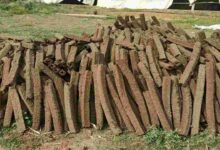Success Story: This farmer from Assam did a business of 30 lakh rupees annually from banana cultivation
Success Story: Being raised in a farming household, Debabrat Rabha developed a strong bond with the land from a young age. Debabrat discovered his genuine vocation in agriculture, while his younger brother joined the Assam Police and his older brother sought a career in teaching. He remembers, “Even as a child, I enjoyed helping my father in the fields.” “During vacations, harvesting vegetables was a pleasure rather than a chore, and I would work in the morning before school.”

Debabrat stuck to his interest, in contrast to many of his contemporaries who were urged to pursue government employment. He had already begun saving money by the time he graduated from high school. With those resources, he bought four bighas of land and started growing sugarcane in 2009. His true success, however, came in 2011 when he began growing bananas with his two cousins, Hiron Rabha and Dipankar Rabha.
Year following year, what began in 2011 with only four bighas grew. The three have earned the unofficial moniker “Banana Merchants of Lower Assam” since they now oversee more than 300 bighas.
Revolution in Bananas: From 4 to 300 Bighas
The four main banana cultivars grown by the Rabha relatives are Senichampa, Jahaji, G9, and Malbhog. They have carefully varied their crops to assure year-round revenue, and each has its own market and demand.
Like other commercial farms, they used chemical fertilizers in their early years. But as time went on, Debabrat saw degradation and soil exhaustion. “The soil was gradually losing its vitality, but our yield was good,” he explains. That worry signaled the start of a steady but progressive transition to organic farming.
Growing Organically and Maintaining It Naturally
It took careful observation, trial and error, and unwavering perseverance for Debabrat to make the shift from chemical-based to organic farming. He remembers, “We discovered that the land remained healthier and that banana plants responded better to natural inputs.”
He gradually embraced a combination of farm-based inputs and biofertilizers, which now serve as the cornerstone of his organic strategy. His toolset consists of recovered farm and pig manure turned into compost, nutrient-rich cow dung compost to increase soil organic matter, and Tech Potash, a bio-potash that is known to improve banana blooming. They now have a competitive advantage in the market because of this sustainable change, which has also increased the quality and shelf life of their bananas and enhanced soil health.
Debabrat thanks the State Agriculture Department, Krishi Vigyan Kendra (KVK), Assam Agricultural University (AAU) Jorhat, and its regional station at Kahikuchi for their prompt advice and assistance during this trip. Their knowledgeable advice has been very helpful in improving his organic farming methods and bolstering the farm’s sustainability.
Fighting the Wind Rather Than the Flood
Because Goalpara is situated in the foothills of Meghalaya, it is not subject to waterlogging like many other flood-prone places in Assam. But that topography also presents a special set of difficulties, including thunderstorms and high winds.
“Our greatest enemy is wind,” acknowledges Debabrat. “60–70% of our standing banana plants can be destroyed by it.” In addition to breaking plants, thunderstorms harm immature banana fingers, which results in early fruit drop and decreased output.
The Rabha cousins have responded to this by using planting techniques like staking and staggered spacing. Even while these initiatives have reduced losses, coping with erratic weather is still difficult.
From Sowing Seeds to Gaining Market Domination
Finding high-quality planting supplies was difficult in the beginning. In particular, seedlings of the G9 variety had to be obtained from far-off places like Bengaluru. However, things are now different. According to Debabrat, “Assam’s agricultural markets are now well-stocked.” For the Jahaji type, we even make our own planting supplies. It is no longer a difficulty. Their self-sufficiency goes beyond planting to include marketing.
Finding the appropriate market was another difficult issue at the start of their banana adventure. He recalls, “We used to struggle to sell at fair prices.” “Middlemen would sometimes take advantage of us.”
Nevertheless, Debabrat and his cousins developed a strong network of purchasers with time, expertise, and increasing trust. Their bananas are now distributed to West Bengal and Bihar in addition to Lower Assam. They are able to keep pricing and earnings consistent even when supply outpaces demand.
A Company Based on Brotherhood and Resilience
This story’s solid family base only serves to heighten its uplifting quality. Debabrat collaborates well with his cousins, and the whole extended family—parents, siblings, kids—supports their combined efforts, forming a close-knit group that prospers as a unit. With pride, he declares, “We are a happy family.” “My brothers have always helped me with this endeavor, even though they have their own careers.” In addition to their accomplishment, their tenacity and solidarity have served as an inspiration to the community.
Many people in the area have been inspired to embrace agriculture seriously, particularly banana production, by their experience growing bananas. They now have more than 15 guys working for them, and they often provide advice and training to those who want to establish their own farms. Many residents have come forward because they were moved by Debabrat’s tale and saw his plan as a viable, successful, and sustainable agricultural approach.
Even though weather variations might sometimes affect yield, the family continues to make a consistent yearly profit of between Rs 20 and Rs 30 lakhs, with Rs 30 lakhs being the new standard in recent years. The results speak for themselves.
Insights from Debabrat Rabha’s Banana Fields
More than merely a motivational story, Debabrat Rabha’s journey from a tiny farmer in Goalpara to the “Banana Merchant” of Lower Assam serves as a model for long-term rural business. His life serves as a reminder of the strength of pursuing one’s passion against social pressures for traditional employment stability. Debabrat not only created a rewarding profession but also secured financial security by opting for farming over a desk job.
His gradual rise from 4 to 300 bighas is a perfect example of the value of beginning small and having big dreams, demonstrating that growth based on forethought and patience can produce amazing results. In addition to being an environmentally conscious decision, his switch from chemical to organic farming gave him a competitive edge and won him a devoted following. Above all, his narrative demonstrates the power of teamwork, how even the most difficult obstacles in nature can be surmounted with the steadfast support of family and the unity of a common goal.

